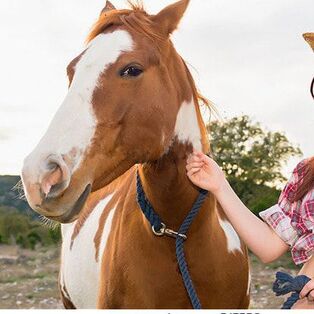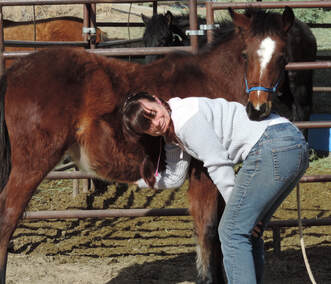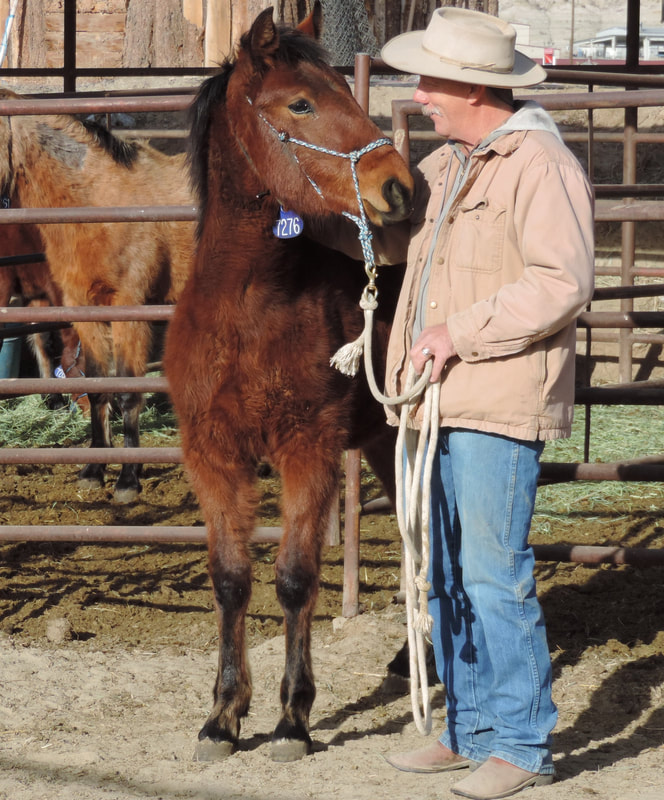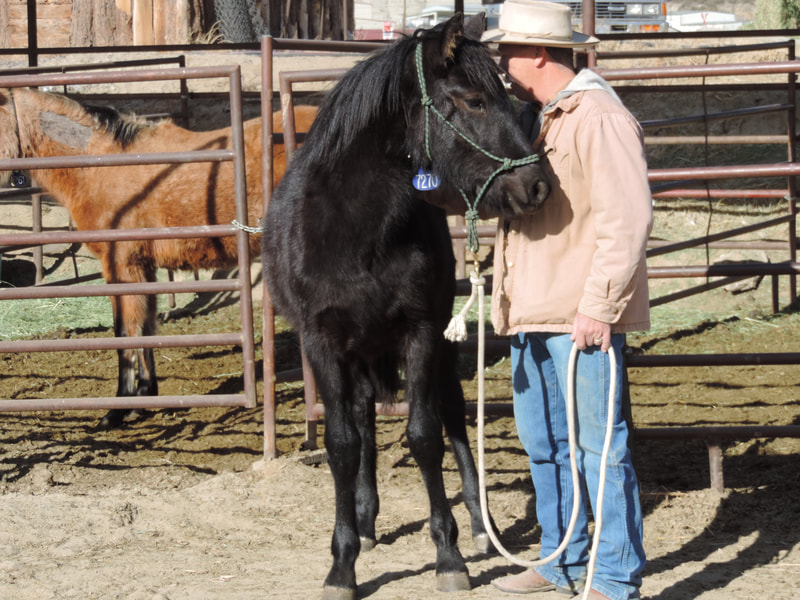 Most of us love cuddling our horses, but sometimes we fail to notice whether or not our horse is enjoying the interaction. With mustangs touching them is the first major obstacle in their educagtion. Until the mustang not only accepts being touched, but also enjoys contact with people only limited progress can be made. We may think we are rewarding a horse with a stroke, pat, or scratch, but if the horse is not enjoying that contact we are doing nothing but inflicting attentions on an unwilling participant, which is absolutely intolerable to a wild horse. For a mustang just learning about humans, any contact they find irritating will hinder their trust in people and can even lead to aggressive/defensive behaviours like striking and biting. We can all relate having handshakes that we did not enjoy at all. Crushing handshakes that make your fingers go numb, handshakes that lasted too long feeling awkward, limp finger handshakes that make you feel like you're fumbling a dead fish, and overly enthusiastic handshakes that threaten to dislocate your shoulder. None of these are pleasant, rewarding greetings and if you know someone who repeatedly greets you in one of these ways you will probably start making excuses to not shake their hand. If a poor handshake can make such a difference in how we feel about other people, just imagine the impact the way we touch a horse has on the way they feel about us. Physical contact is a highly personal thing to horses, they usually only allow their closest herdmates to have friendly contact with them. When we are touching a horse we are treading on sacred ground. Granting permission to be touched is a supreme act of trust for a mustang to extend to a person. Just as a handshake can be unpleasant in a variety of ways, a horse can find human touch intolerable in multiple ways. We can be too firm, too fast, too soft, too often, etc. How a horse likes to be rubbed is individual to each horse. Taking the time to learn where a horse likes being rubbed, stroked, and scratched is one of the best ways to build a trusting relationship, and will prevent your horse from making excuses not to let you touch them. When our touch is not enjoyable, a horse will express discomfort in small ways to let us know that the contact unwelcome. If a horse leans away from, or appears to try dodging an outstretched hand, even a tiny bit, this is a clear message that they don't want our caresses. While the horse pictured at the left is clearly not afraid of being touched, it should be also as obvious that the horse is not inviting this pet. Ears put back, a tiny bit of tension in the nostrils, the expression in the eye is a little hard, but most of all the horse is drawing away from the hand, not only with its head, but its whole body. These are subtle signs, but very important to knowing whether the horse is approving of this stroke or not. Most likely raised by humans this horse has learned to tolerate sometimes being pawed in a way that it doesn't care for. We may want to express our affection by giving big tight hugs around our horsey's neck, but most horses find this sort of contact restrictive, disturbingly predatory, and uncomfortable. Any horse that actually enjoys a big bear hug only does so as an acquired taste. Something it has learned to be comfortable with due to repetition, and because the hugs usually are coupled with pleasant things like rest from work, or treats. All horses have to learn to put up with human ineptitude to some extent or other, but we really should try our best not to annoy our horses too much. You will notice I have not used the word patted. Horses do not care for being being patted, they prefer rubbing or stroking so much more. Patting dulls their sensitivity to rhythmic pressure. Many times I have seen that the more pleased a person is with their horse the harder they pat it until it looks like they are trying to slap a fly straight through the other side of the horse's neck. In their enthusiasm to reward the horse they don't notice that the pat has turned into a physical assault and appears more like they are hitting their horse rather than giving an affectionate pat. In my opinion patting is a bad habit to get into, so just quit it already people! In contrast, how do you know if a horse is welcoming contact? The best way to explain is by showing some examples.  Notice each in each of these pictures the horses' ears are forward and they are leaning towards the human, their eyes are soft and content looking. Both photos are of mustangs that were relative new to captivity, but both look confident in the contact and have not formed a negative opinion about being touched by people. When horses are really enjoying a massage, their upper lip will twitch with pleasure. This twitching lip is the beginning of mutual grooming behaviour which is an ultimate sign of acceptance from a horse. This is the kind of interaction that horses find particularly rewarding. Dominant horses are usually the ones to initiate mutual grooming determining how intense and how long the grooming lasts. So, a mutual grooming rub builds relationship not only because you are doing something your horse likes, but it is also a subtle way to establish yourself as a higher rank in the herd. The horse at the right is returning the favour by nuzzling the person massaging him. Be cautious if your horse wants to rub on you in return, they do not know their own strength and sometimes can nip hard enough to bruise a puny human. Remember it is the dominant horse who determines the intensity of the mutual groom. Set clear boundaries of how much return rubbing you will allow, but never, never, punish a horse for wanting to return affection in this way. That would be insulting to the horse, like slapping someone's hand away when they are offering to shake with you. If the horse begins getting too vigorous in its return rubbing just quit massaging the horse(before teeth get involved) and direct the horse's nose away with a gentle push. They will get the point and learn to restrain themselves in their displays of affection. How we touch a horse is extremely meaningful to them. Even with the best of intentions we can be bothersome to a horse by not being sensitive to the way they like to be touched. Especially when trying to establish a trusting relationship with a wild horse, we need to touch them in a manner they enjoy so they will find our company comfortable and peasant.
0 Comments
Leave a Reply. |
AuthorTrainers and mustang owners sharing their experiences and insights about mustangs. Archives
November 2022
Categories
|


 RSS Feed
RSS Feed